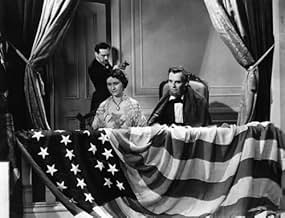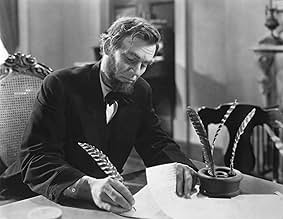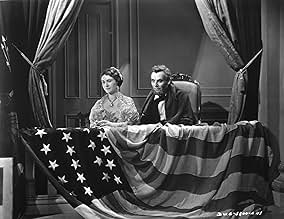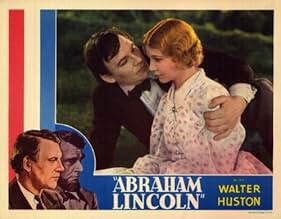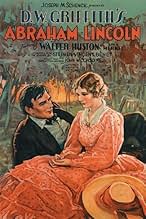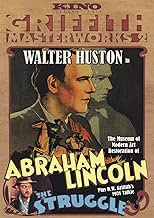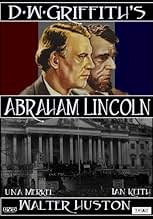IMDb RATING
5.7/10
1.8K
YOUR RATING
An episodic biography of the 16th President of the United States.An episodic biography of the 16th President of the United States.An episodic biography of the 16th President of the United States.
- Awards
- 4 wins total
William L. Thorne
- Tom Lincoln
- (as W.L. Thorne)
Edgar Dearing
- Armstrong
- (as Edgar Deering)
Jason Robards Sr.
- Herndon
- (as Jason Robards)
Cameron Prud'Homme
- John Hay - Secretary to the President
- (as Cameron Prudhomme)
James Eagles
- Young Soldier
- (as Jimmie Eagle)
Featured reviews
... "personally directed" by D. W. Griffith. Walter Huston stars as Lincoln, shown from his birth through his rough-and-tumble early years, his doomed romance with Ann Rutledge (Una Merkel), his marriage to the eccentric Mary Todd (Kay Hammond), and his election to the presidency, where he presided over the U. S. Civil War, during which he wrote the Emancipation Proclamation freeing the slaves, before being felled by an assassin's bullet.
Like most of Griffith's movies, this is a mixed bag of interesting choices, corny populism, and a rose-colored vision of the past. I was surprised by the opening of the film, set aboard a trans-Atlantic slave ship, featuring slave traders coldly discussing their remaining "inventory" as they toss a dead African overboard. As this was one of a few scenes missing its audio, I have a feeling it was often cut out during exhibition.
I was confused by Griffith's decision to cast E. Alyn Warren as both Stephen Douglas and Ulysses Grant: were there not enough qualified actors around? I liked seeing silent film stalwarts Hobart Bosworth and Henry B. Walthall as General Robert E. Lee and his attendant colonel, respectively. I liked Walter Huston as Honest Abe, and was surprised by how much he looked like the photographs of Lincoln in the last third of the film.
The biopic elements themselves are simplistic and hagiographic, and things seemed rushed, trying to tell his entire life story in 90 minutes. I was not a fan of Hammond as Mary Todd, and felt she dragged the proceedings down quite a bit.
Like most of Griffith's movies, this is a mixed bag of interesting choices, corny populism, and a rose-colored vision of the past. I was surprised by the opening of the film, set aboard a trans-Atlantic slave ship, featuring slave traders coldly discussing their remaining "inventory" as they toss a dead African overboard. As this was one of a few scenes missing its audio, I have a feeling it was often cut out during exhibition.
I was confused by Griffith's decision to cast E. Alyn Warren as both Stephen Douglas and Ulysses Grant: were there not enough qualified actors around? I liked seeing silent film stalwarts Hobart Bosworth and Henry B. Walthall as General Robert E. Lee and his attendant colonel, respectively. I liked Walter Huston as Honest Abe, and was surprised by how much he looked like the photographs of Lincoln in the last third of the film.
The biopic elements themselves are simplistic and hagiographic, and things seemed rushed, trying to tell his entire life story in 90 minutes. I was not a fan of Hammond as Mary Todd, and felt she dragged the proceedings down quite a bit.
This film was to be D.W. Griffith's big comeback production, and it did very well for "the old master." In fact, it was chosen as number two of the Ten Best Pictures of 1930 by The Film Daily, just below "All Quiet On The Western Front!" Sadly, due to the horrible condition of the available prints of this film, no really fair analysis can be made today. As with so many early talkies, Abraham Lincoln is now a sickly shadow of what it was in 1930. To begin with, it's original running time is listed at approximately 96 minutes. The version presented on Laserdisc runs 83 minutes.The film shows signs of wear and duping. The soundtrack is horribly distorted and, in several scenes, seems to be missing totally, replaced by terrible music from a stock library. Even so, if one can look past these things and take the acting style in the context of its time, one can see that Griffith had not lost his flair and would have probably continued directing had the fates (and probably Hollywood) not conspired against him. There are wonderful cinematic moments, reminiscent of some of his earlier triumphs. This is a film that cries out for restoration but, alas, there is most likely little or nothing left to restore. UPDATE: In 2008, KINO International released a DVD version of Abraham Lincoln that is far more complete than the old Laserdisc I reviewed from in 1998. While some soundtrack from the Prologue is still missing, KINO has made up for it by adding subtitles for the missing dialogue. Also, the picture quality is far superior to anything else available. It is evident that much effort went into making this forgotten film much more watchable and available!
Walter Huston gets an A for effort, his performance is certainly far too melodramatic, but he clearly put a lot of heart and soul into it. Besides, the melodrama is more the fault of director D.W. Griffith, who seems to have lost his touch with his talkie films. Very patriotic,not particularly well produced. It falls among those films that were in the transition from silent to sound and have that awkwardness about them. The art direction is rather peculiarly phony looking, and that last shot of the Lincoln Memorial, it seems it would have been cheaper and easier just to get actual footage of the monument itself, rather than to make that phony looking model
If Griffith had stuck to Lincoln's personal life, this could have been an interesting, amusing, and occasionally insightful film. Griffith gives us a multi-layered and largely accurate portrait of Lincoln the man. We see the ungainly country lawyer, countrified in speech and manner, often serious, even melancholy, but with a rare ability to find humor in the most unlikely places and to laugh even at himself. We see Lincoln the inveterate story-teller, the insomniac, the doting father, the determined commander-in-chief the patient husband. If this had been the whole of the film, it would have been easy to overlook its painfully outdated style and to forgive its frequent omissions and exaggerations as poetic license.
Unfortunately, the film necessarily includes Lincoln's political life, and here it moves from poetic license to outright falsehood. Slavery was the central issue of Lincoln's political career, a fact that Griffith tries to obscure, going so far as to turn Lincoln's pivotal 'House Divided' speech into an argument against secession. This is particularly ironic since it was really Lincoln's battle cry against encroaching slavery. When South Carolinians seceded two years later, this was the speech they pointed to as proof that when Lincoln took office, "the slaveholding States will no longer have the power of self-government ... and the Federal Government will have become their enemy."
During Lincoln's presidency, the question of slavery occupied much of his time and attention, yet again Griffith chooses to ignore it. His Lincoln spends more time admiring the courage of Confederate soldiers than worrying about slavery. Even the Emancipation Proclamation gets only the briefest attention. Lincoln reads a line from the document, signs it, and says, "Well, gentlemen, it is done." It's oddly dismissive, coming from a man who considered emancipation the central act of his presidency and the most meaningful act of his life.
Denied his opposition to slavery and concomitant commitment to democracy and the inalienable rights of man, Lincoln is reduced to endlessly repeating, "The Union must be preserved." Why it must be preserved is left to the audience's imagination. The film never gives us the slightest clue.
Unfortunately, the film necessarily includes Lincoln's political life, and here it moves from poetic license to outright falsehood. Slavery was the central issue of Lincoln's political career, a fact that Griffith tries to obscure, going so far as to turn Lincoln's pivotal 'House Divided' speech into an argument against secession. This is particularly ironic since it was really Lincoln's battle cry against encroaching slavery. When South Carolinians seceded two years later, this was the speech they pointed to as proof that when Lincoln took office, "the slaveholding States will no longer have the power of self-government ... and the Federal Government will have become their enemy."
During Lincoln's presidency, the question of slavery occupied much of his time and attention, yet again Griffith chooses to ignore it. His Lincoln spends more time admiring the courage of Confederate soldiers than worrying about slavery. Even the Emancipation Proclamation gets only the briefest attention. Lincoln reads a line from the document, signs it, and says, "Well, gentlemen, it is done." It's oddly dismissive, coming from a man who considered emancipation the central act of his presidency and the most meaningful act of his life.
Denied his opposition to slavery and concomitant commitment to democracy and the inalienable rights of man, Lincoln is reduced to endlessly repeating, "The Union must be preserved." Why it must be preserved is left to the audience's imagination. The film never gives us the slightest clue.
No doubt about it, D.W. Griffith was one of the great directors of the early silent era. "Birth of a Nation," "Intolerance," "Orphans of the Storm," even a lesser-known film like "The Musketeers of Pig Alley" are all now regarded as classics. Unfortunately, for whatever reasons, Griffith couldn't maintain his success record, and, by the time he made his first all-talking film, "Abraham Lincoln," he was in the midst of a major slump that he just couldn't pull out of. The film is static, stilted, and moves at a snail's pace. Walter Huston, Ian Keith, Henry B. Walthall, and most of the rest of the cast all had distinguished careers in sound films, but here they are merely wasted, unable to cope with the tedious dialogue and Griffith's uncharacteristicly stiff direction. Worst-served of all, though, is Una Merkel, here in one of her first films. I can't believe that Anne Rutlidge could have been such a sugary simp as we're led to believe by her performance here, and her death scene is only exceeded for bathos by Ali McGraw in the last scene of "Love Story." In sum, a major disappointment, a good cast wasted, and a sad farewell form one of American film's true pioneers. Griffith described making this film as "a nightmare of the mind and nerves," and, unfortunately, that's just what it is, for him and us.
Did you know
- TriviaThis was D.W. Griffith's first sound film. Abraham Lincoln (1930) was also the first sound film about the Civil War which veterans of that war could view.
- GoofsIn both the Union and Confederate parades, the musicians play trombones with forward facing bells. During the Civil War, the bells faced backwards.
- Quotes
[death scene]
Ann Rutledge: I know the truth, dear. It's goodbye.
Abraham Lincoln: No, no, Ann, dear. You're not going to leave me. I won't let you!
Ann Rutledge: We must be brave, dear...
[looking up to the heavens]
Ann Rutledge: Don't take me away. Don't take me away! It's so dark and lonesome!
Abraham Lincoln: Ann, you mustn't let go.
Ann Rutledge: If they'd sing, I wouldn't be so afraid.
[a chorus of "Sweet By and By" swells up in the background]
Ann Rutledge: We will meet there, dear.
- Alternate versionsOriginally, this film was color-tinted in sepia-tone, with blue for night scenes. These prints also had a prologue. Current public-domain prints are in black and white, minus the prologue with a shorter running time.
- ConnectionsEdited into General Spanky (1936)
- SoundtracksBattle Hymn of the Republic
(ca 1856) (uncredited)
Music by William Steffe
Lyrics by Julia Ward Howe (1862)
Played during the opening credits and often in the score
Sung by an offscreen chorus during a civil war scene
- How long is Abraham Lincoln?Powered by Alexa
Details
- Release date
- Country of origin
- Language
- Also known as
- D.W. Griffith's Abraham Lincoln
- Production companies
- See more company credits at IMDbPro
- Runtime
- 1h 36m(96 min)
- Color
- Aspect ratio
- 1.20 : 1
Contribute to this page
Suggest an edit or add missing content

